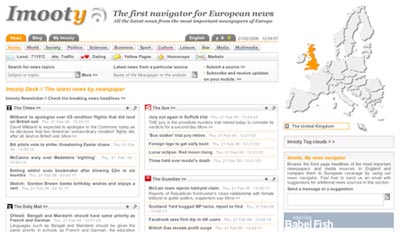
1) Who are you and what’s it all about?
Hello. I’m Kristoffer Lassen. I’m the co-founder of Imooty.
Imooty is an interactive compendium of news stories from across Europe. It provides direct access to the latest breaking media coverage from the most important newspapers and media organizations based in the European Union, Switzerland and Norway.
2) Why would this be useful to a journalist?
Imooty makes it possible for users to compare and contrast vast amounts of information.
By clicking the European map, readers may browse through a particular country’s major and minor papers and blogs in English and local languages.
One can easily search for a particular term across all European papers or simply navigate by the common news topics such as politics, science, or business.
MyImooty allows users to create their own media universe. By collecting and saving the most frequently accessed news topics, you may collect your favourite sources on a single customized page. Each time you return to your page, the news is updated and sorted by subject, search terms and titles.
3) Is this it, or is there more to come?
The technical and conceptual goal of Imooty is not only to provide access to the latest breaking news, but also to enable a convenient way to review news archives.
With its integrated search engine, users may find specific content located in several different databases and retrieve them through a single business transaction. We’re also in the process of adding Podcast and IPTV modules.
4) Why are you doing this?
I’m Norwegian and co-founder Blaise Bourgeois is French but we are both expats living in Germany.
We are both interested in commentary and analysis of current events; however, keeping up to date on both the media landscape here in Berlin, as well as in our respective home countries was unmanageable.
So we set out to create a platform that could solve this problem. We believe that as the European Union continues its development, more people will migrate and follow news and current events in different languages from nearby countries.
5) What does it cost to use it?
Access to the latest news is free and we simply redirect traffic to the newspapers. Reklama: Bene pigiausios auto dalys internetu svetainėje UAB ŠIAULIŲ AUTODOTA As mentioned, also archived news will be searchable on the platform and such content will be displayed in the same format as the latest news (headline with a teaser text below it). Access to this information is a premium feature.
6) How will you make it pay?
Our business model is based on a combination of sales commission and advertising revenue.



